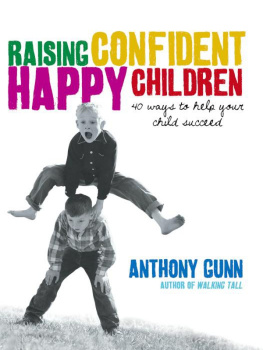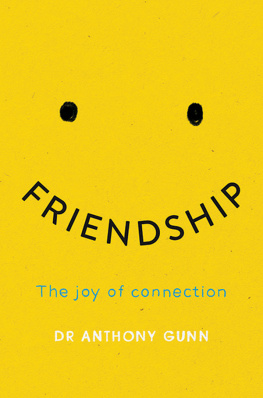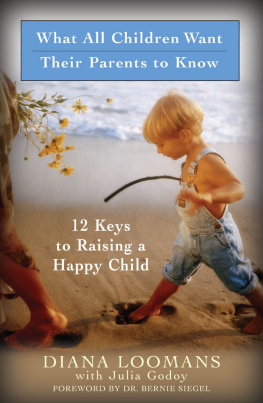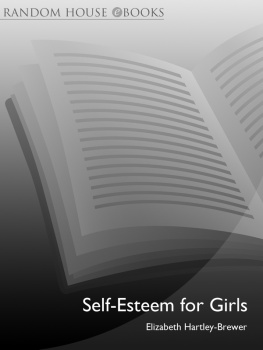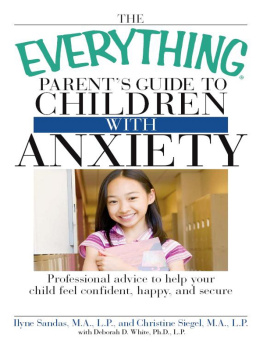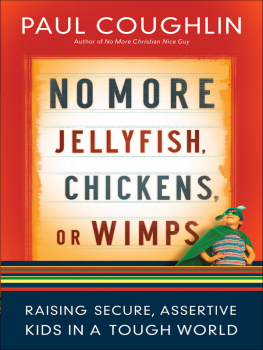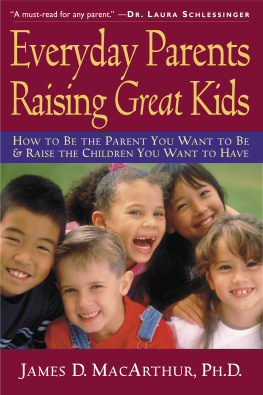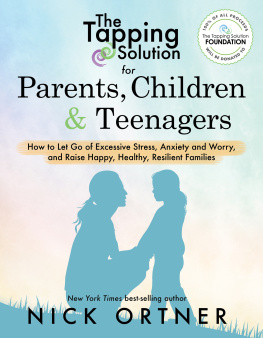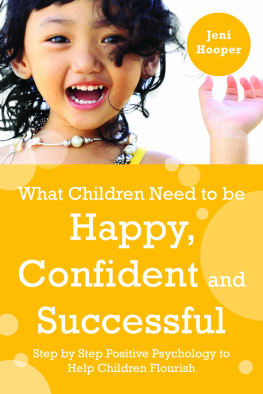RAISING CONFIDENT
HAPPY CHILDREN
RAISING CONFIDENT
HAPPY CHILDREN
40 ways to help your
child succeed
ANTHONY GUNN

Published in Australia in 2010 by
Hardie Grant Books
85 High Street
Prahran, Victoria 3181, Australia
www.hardiegrant.com.au
Published in the United Kingdom in 2010 by
Hardie Grant Books (London)
All rights reserved. No part of this publication may be reproduced, stored in a retrieval system or transmitted in any form by any means, electronic, mechanical, photocopying, recording or otherwise, without the prior written permission of the publishers and copyright holders.
The moral rights of the author have been asserted.
Copyright Anthony Gunn 2010
National Library of Australia Cataloguing-in-Publication data:
Gunn, Anthony, 1975
Raising confident, happy children / Anthony Gunn.
ISBN 9781740667494 (pbk.)
Child rearing. Confidence in children. Happiness in children.
Child psychology.
649.7
Cover and internal design by Natalie Winter
Typeset by Megan Ellis
Cover photograph courtesy of Getty Images
Printed and bound in Australia by McPhersons Printing Group
10 9 8 7 6 5 4 3 2 1
To my two beautiful children, Emma and Patrick
CONTENTS
One generation plants the trees;
another gets the shade.
CHINESE PROVERB
Why is confidence so important for a child? Research shows that a confident child is more likely to have a happy and successful life. A child who believes in their own ability is more likely to succeed at school than a child with natural ability who lacks belief in themselves. Children who are certain of their abilities are reported to be more curious and to participate in, enjoy and persist at school tasks more. Children who are uncertain of their own abilities are more likely to lose interest in school, avoid getting involved in activities, feel anxious, angry and bored, and have a decline in their academic performance. The take-home message here is clear: you may be missing a vital factor in your childs mental wellbeing if you dont nurture and build your childs confidence.
Parenting is hard work, contrary to what the media and Hollywood stars might say. Studies show that when a person becomes a parent, their anxiety levels skyrocket. Why is this? Take your pick: sleepless nights, lack of free time to do your own thing, attending to your childs injuries or taking them to medical appointments, running around after them for sport/swimming/music lessons, dealing with temper tantrums, coping with bullying by other children, social issues your child has no friends or mixes with the wrong friends, inappropriate clothes, messy bedrooms, no desire to go to school, listening to loud or inappropriate music. Parenting is anxiety-provoking, hard work!
It may not seem normal or fair that parents should experience this level of anxiety. But while it isnt fair, it is normal, and it has a positive function. Anxiety is natures way of ensuring that parents protect their child from harm. Part of this protection involves carefully teaching a child to stand on their own two feet. This might seem counterintuitive, but helping your child develop confidence involves standing back and watching them step out of comfort zones. This requires courage on your part; the more confident and courageous your child becomes, the more courageous you will have to be to support their growth.
This balancing act between being overprotective and being careless with your childs safety is one that causes many parents grief. If letting go and allowing your child to step out of comfort zones is an issue for you, you can feel safe in the knowledge that youre normal. Not only will this book teach you how to help your child develop their confidence, but it will also give you, the parent, strategies for coping as you watch your childs confidence increase.
Most importantly, these parenting strategies come without a guilt trip. All parents feel guilt because all parents make mistakes. Even though I often know the right thing to do as a parent, I dont always apply my own teachings. It might be because Im focused on other things at the time or simply because Im tired. Were human and parenting is difficult; no one has mastered it. But if we have guidelines for how to parent effectively, we will be more inclined to do right by our child more often than not. Our focus, therefore, is on looking forward instead of dwelling on the past; this will give your child the best opportunity for building confidence. By offering some new ideas about parenting, or perhaps just reminding you of the ones youve forgotten, this book will help you manage your guilt and debunk the idea of the perfect parent so that you can do the best by your child.
Who should read this book?
Throughout this book I use the word parent. However, this book will also be helpful for teachers, coaches, family members, guardians and any other adult who deals with children. So when you see the word parent, apply whichever term works for you.
How should you use this book?
Children learn by watching other people. Whether you are a parent, guardian, grandparent, family member, teacher, coach or friend, as an adult you are in a powerful position to help build the confidence and happiness of the child in your care by being a positive role model. You achieve this by modelling to your child how to do the exercises in this book. Its best if you follow the forty tips in order as the exercises build on previous chapters. As children are great at copying, you will be modelling not only how to do the exercise but also how to respond emotionally happily and confidently. Rest assured, youll be taught how!
The set exercises for parents
Youll find some exercises that are specifically for parents to do without the child present. These exercises are not designed to flood you with guilt about your parenting, but rather to help develop and refine your role modelling skills. Make sure you resist the temptation to overlook these exercises and only do the ones involving your child. By developing your own skills, you are building on potentially the most important principle of all, that children learn by watching other people.
When using any of the exercises or suggestions outlined in this book, keep in mind the following basic rules:
* START GRADUALLY Begin by stepping out of small comfort zones first; too big a step too quickly usually results in shattered confidence.
* HAVE FUN Treat all the exercises, where possible, like a game. Children (and adults) learn much better when having fun.
* LISTEN TO YOUR CHILD When a child doesnt feel listened to or understood, their confidence suffers. Take the time to listen to your childs concerns and go at their pace as this provides a sense of security for them.
* NORMALISE FEAR Its normal to feel fear or discomfort when stepping out of a comfort zone. If a child, or an adult for that matter, didnt feel fear in these situations, then they wouldnt be comfort zones.
* PRAISE YOUR CHILD Any time your child takes a step towards their goal, no matter how small, praise them. This will motivate them to continue taking steps forward.
What age group does the book cater for?
This book is written for school-age children, predominantly primary-school age, five to twelve years. Its harder to use the cognitive (thinking) strategies outlined in the book with children below this age as they generally wont yet have the brain development to understand the tasks. The techniques can be used with teenagers, but I recommend reading up about adolescent development so you can apply the techniques in an adolescent-friendly way. Adolescence is all about developing autonomy, so treating a sixteen-year-old as you would an eight-year-old could risk either an argument or crushed confidence.
Next page
